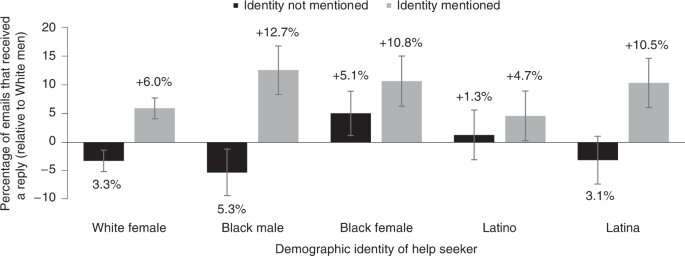Highlighting gender and race is effective when requesting career help

Wharton School researchers found that people are significantly more likely to offer career help to women and racial minorities when help seekers mention their underrepresented identity in requests. The research, published this month in Nature Human Behavior, is led by Wharton Ph.D. candidate Erika Kirgio, along with fellow Ph.D. candidate Aneesh Rai, Katy Milkman, the James G. Dinan Professor, and Wharton alum Edward Chang.
Receiving help can make or break a career, but it can be harder for women and racial minorities to receive the support they seek due to stereotypes, biases, and in-group favoritism, according to Kirgios.
"We know, both from research and personal experience, how invaluable it can be to get a helping hand when you're trying to build your career," Kirgios says. "And that kind of help can be particularly important for members of marginalized groups. Referrals, for example, have been shown to close or diminish identity-based biases in people's evaluations of job candidates. So, getting people to offer more help to women and racial minorities can help reduce workplace inequity."
The research tested whether women and racial/ethnic minorities benefit from explicitly mentioning their demographic identity in requests for help. Mentions of demographic identity include statements like: "As a woman in tech …" or "As a young Black man/woman in venture capital …" or "I'm a Latino entrepreneur."
To explore this question, the team conducted two audit experiments, one with 2,447 local politicians and another with more than 1,000 students. In both cases, the participants received help-seeking emails that either did or did not emphasize a marginalized sender's identity. In the experiment with politicians, some participants received emails from white men, while others received emails from women and racial minorities. In the experiment with students, all participants received emails from racial minorities.
"The great thing about audit experiments is that the participants are just living their lives. They don't know their behavior is being studied," Kirgios says. "They believe the emails are coming from real people, and they just respond—or don't—as they normally would. That allows us to make much stronger claims about how likely this strategy is to work for the average person in their daily life."
The team found that for majority group members, mentioning identity by calling oneself a "young man" didn't yield a benefit. But for women and racial minorities, mentioning identity increased politicians' and students' willingness to offer help by 24.4% and 79.6%, respectively.
"Even the 24.4% increase is quite large for an experiment in the real world. It's bigger than the discriminatory gaps that have been identified in many prior experiments of this kind," says Kirgios.
The team tested and found this effect for several types of asks, including requests for advice, for help on a task, and for a referral. When exploring why mentioning identity might increase people's willingness to offer help in follow-up studies, the team found evidence that it may activate prospective helpers' motivations to avoid prejudiced reactions and increase their willingness to provide support.
"Basically, our results suggest that people see the help requests as an opportunity to prove, to themselves and to others, that they support women and racial minorities and therefore are not prejudiced," Kirgios explains. "Everyone wants to believe they're a good person, and that desire drives a lot of their decisions."
These finding suggest that deliberately mentioning identity in requests for help can improve outcomes for women and racial/ethnic minorities.
More information: Erika L. Kirgios et al, When seeking help, women and racial/ethnic minorities benefit from explicitly stating their identity, Nature Human Behaviour (2022). DOI: 10.1038/s41562-021-01253-y
Journal information: Nature Human Behaviour
Provided by University of Pennsylvania




















